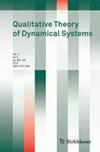具有两个 1: $$-q$$ 共振鞍点的立方 $$Z_2$$ 参数系统的可积分性与线性化
IF 2.1
3区 数学
Q1 MATHEMATICS
引用次数: 0
摘要
本文研究了一类立方\(Z_2\)-可变系统 \(\dot{x}=-\frac{1}{2}x-a_{21}y+\frac{1}{2}x^3+a_{21}x^2y+a_{12}xy^2+a_{03} y^3 的可整性和线性化、\, \dot{y}=(-q-b_{21})y+b_{21}x^2y+b_{12}xy^2+b_{03}y^3, \)进行研究。对于任意正整数 q,我们通过理论分析得到了上述系统的前三个鞍量。此外,对于任意正整数 q,我们推导出了上述系统在某些假设条件下线性化的必要条件和充分条件。本文章由计算机程序翻译,如有差异,请以英文原文为准。
The Integrability and Linearizability of Cubic $$Z_2$$ -Equivariant Systems with Two 1: $$-q$$ Resonant Saddle Points
In this article, the integrability and linearizability of a class of cubic \(Z_2\)-equivariant systems \(\dot{x}=-\frac{1}{2}x-a_{21}y+\frac{1}{2}x^3+a_{21}x^2y+a_{12}xy^2+a_{03} y^3,\, \dot{y}=(-q-b_{21})y+b_{21}x^2y+b_{12}xy^2+b_{03}y^3, \) are studied. For any positive integer q, we obtain the first three saddle quantities of the above systems by theoretical analysis. Moreover, for any positive integer q, we derive the necessary and sufficient conditions for the linearizability of the above systems under some assumptions.
求助全文
通过发布文献求助,成功后即可免费获取论文全文。
去求助
来源期刊

Qualitative Theory of Dynamical Systems
MATHEMATICS, APPLIED-MATHEMATICS
CiteScore
2.50
自引率
14.30%
发文量
130
期刊介绍:
Qualitative Theory of Dynamical Systems (QTDS) publishes high-quality peer-reviewed research articles on the theory and applications of discrete and continuous dynamical systems. The journal addresses mathematicians as well as engineers, physicists, and other scientists who use dynamical systems as valuable research tools. The journal is not interested in numerical results, except if these illustrate theoretical results previously proved.
 求助内容:
求助内容: 应助结果提醒方式:
应助结果提醒方式:


